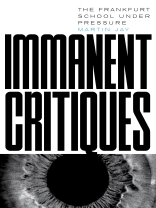Fifty years after the appearance of The Dialectical Imagination, his pioneering history of the Frankfurt School, Martin Jay reflects on what may be living and dead in its legacy. Rather than treating it with filial piety as a fortress to be defended, he takes seriously its anti-systematic impulse and sensitivity to changing historical circumstances. Honouring the Frankfurt School’s practice of immanent critique, he puts critical pressure on a number of its own ideas by probing their contradictory impulses. Among them are the pathologization of political deviance through stigmatizing 'authoritarian personalities, ’ the undefended theological premises of Walter Benjamin’s work, and the ambivalence of its members’ analyses of anti-Semitism and Zionism. Additional questions are asked about other time-honored Marxist themes: the meaning of alienation, the alleged damages of abstraction, and the advocacy of a politics based on a singular notion of the truth.
Rather, however, than allowing these questions to snowball into an unwarranted repudiation of the Frankfurt School legacy as a whole, the essays also acknowledge a number of its still potent arguments. They explore its neglected, but now timely analysis of 'racket society, ’ Adorno’s dialectical reading of aesthetic sublimation, and the unexpected implications of Benjamin’s focus on the corpse for political theory. Jay shows that it is a still evolving theoretical tradition which offers resources for the understanding of – and perhaps even practical betterment – of our increasingly troubled world.
O autorze
Martin Jay is Sidney Hellman Ehrman Professor of History Emeritus at the University of California, Berkeley, where he taught Modern European Intellectual History and Critical Theory for forty-five years. Among his works are The Dialectical Imagination; Marxism and Totality; Adorno; Permanent Exiles; Fin-de-si�cle Socialism; Force Fields; Downcast Eyes; Cultural Semantics; Refractions of Violence; Songs of Experience; The Virtues of Mendacity; Essays from the Edge; Kracauer: l’exil�; and Reason after Its Eclipse. He has been a regular columnist for Salmagundi since 1987.












